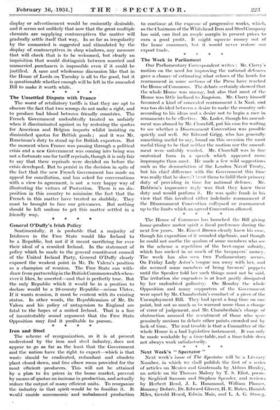The Week in Parliament Our Parliamentary Correspondent writes : Mr.
Clarry's motion on the need for, improving, the national defences gave a chance of estimating what echoes of the howls for rearmament in some sections of .the Press have reached the House of Commons. The debate certainly showed that the whole House was uneasy, but also that most of the House was little inclined to Jingoism. Mr. Clarry himself favoured a kind of concealed rearmament la Nazi, and was too divided between a desire to make the country safe according to his ideas and a desire not to begin a race in armaments to be effective. Mr. Loder, though his amend- ment was abused by Mr. Churchill, put his case for waiting to see whether a Disarmament Convention was possible quietly and well. Sir Edward Grigg, who has generally something useful to say, found on this occasion the most useful thing to be that neither the motion nor the amend- ment were suitably worded. Mr. Churchill was in fine oratorical form in a speech which appeared more impromptu than most. He made • a few wild suggestions such as the denunciation of the London Naval Treaty, but his chief difference with the Government this time was really that he does:et trust them to fulfil their primary duty of providing in time for national defence. Air. Baldwin's impressive reply was that they knew their duty and would perform it. He was quite frank in his view that this involved either indefinite rearmament if the Disarmament Convention collapsed or rearmament up to the limits which an agreed Convention allowed.








































 Previous page
Previous page